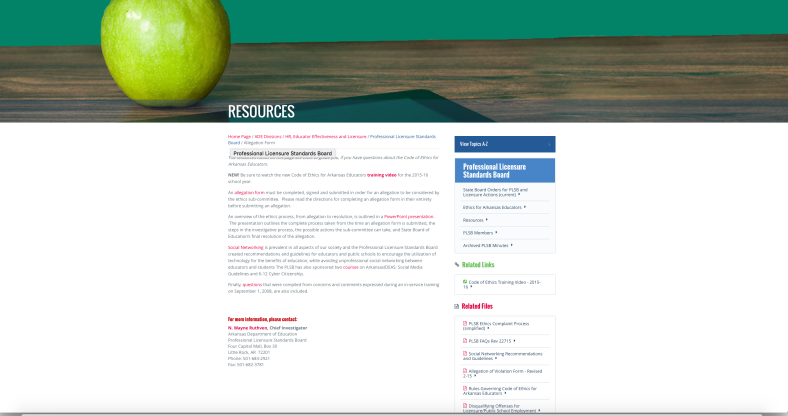Introduction
In September 2008, the Arkansas State Board of Education adopted the Code of Ethics for Arkansas Educators, and in doing so, facilitated a criteria by which Arkansas educators must conduct themselves inside and outside the classroom. While various teachers’ codes of ethics have been around for decades, Arkansas’s relatively recent adoption creates more questions than it answers—especially in terms of how teachers use social media.
The Code of Ethics is integral to safeguarding the children of our state because, well, let’s be honest— there are some creepy people out there. One need only utter the word “educator” in mixed company and jokes concerning Mary Kay LaTourneau eke into the discussion. Unfortunately, Arkansas has played host to several cases of inappropriate and/or sexually predatory teacher/student relationships in the last decade, and it is largely because of this the Arkansas State Board of Education adopted the Code with support from educators around the state.
Essentially, the Code of Ethics for Arkansas Educators allows the Arkansas State Board of Education to penalize anyone who holds a teaching license in the state if found “guilty” of a violation of the Code including, but not limited to, a monetary fine; suspension of one’s teaching license; or permanent revocation of an Arkansas teaching license. Even though the Code is a relatively recent adoption, it does not explicitly take into account the explosion of technology and social media associated with educator social media use. Luckily, the Arkansas Department of Education has attempted to remedy this by providing a plethora of professional development opportunities specifically concerning the Code and has created various types of presentations—from .pdf to PowerPoint to video— with information about everything that will help an Arkansas educator understand the importance of his/her professional behavior and the Code of Ethics for Arkansas Educators. The Arkansas Department of Education (ADE) has worked diligently to produce up-to-date information for educators across the state in the hopes that teachers will take advantage of the material before major ethical violations are committed. The Resources tab on the ADE website is the most important page in exploring the Code and garnering answers to frequently asked questions.
As a high school teacher, I’ve often wondered if my personal social media profiles warranted a violation of the Code. I erroneously believed that I could cite the First Amendment to the U.S. Constitution in order to continue posting whatever I wanted on social media such as Facebook and Twitter, but according to the National Education Association, the United States Supreme Court case Pickering versus Board of Education, “held that it’s not a First Amendment violation to dismiss probationary teachers for what they say or write, if their speech involves merely personal things (i.e. doesn’t address broader social/political issues of the day), or if the speech might disturb the workplace” (Simpson). Along the same lines, Frederick Lane, an attorney and author of Cybertraps for Educators and Cybertraps for the Young, frames this dilemma with a rhetorical question he poses to the audience of an ADE professional development workshop, “Do teachers have the right to a digital life?”, explaining that teachers are role models for students, whether we like it or not, and we must remain cognizant of this at all times (“Professional Licensure Standards Board (PLSB): Social Media Guidelines”). Lane does not discuss specific standards from the Code of Ethics for Arkansas Educators, but he does give a general explanation of what has happened in cases of teacher ethics violations across the country to highlight the importance of recognizing the tenuous position an educator is in when writing or posting on personal and professional social media accounts.
The Standard (Thought we’d never get there, eh?)
The standard which is the most general within the Code, Standard One, is also the standard violated by educators repeatedly, “two-three times more than any other violation reported” ( “Code of Ethics For Arkansas Educators Training Video”):
“Standard One: An educator maintains a professional relationship with each student, both in and outside the classroom” (Code of Ethics for Arkansas Educators).
According to the ADE training video on the Code, Standard One was “intentionally written very broadly to ensure all possible educator/student professional relationship concerns could be included”. Given its sweeping generality, this is the standard under which the ADE files social media violations. Furthermore, ADE is explicit in “Recommendations and Guidelines Regarding the Educational Applications of Social-Networking Technology Issued by the Arkansas Professional Licensure Standards Board”—a document written specifically for social media in education— that, if and when an educational social media account is approved by district administration, personal and professional/educational social media accounts maintained by an educator should be kept separate at all times:
E-mail and/or social media tools and accounts should be kept separate.
- Professional accounts should be created and maintained separately for student and/or parent interaction and communications. An authorized administrator or his or her designee should regularly monitor professional accounts and have full rights to modify the accounts.
- Personal accounts should be for personal use only. School personnel should not add students and/or parents as “friends” or “associates” to personal accounts.
Keeping your personal account and an account you create for your 9th grade English class in which you and your students must retell The Tragedy of Romeo and Juliet through Facebook status updates is integral to maintaining a professional distance, especially given the not-so-stellar judgment we’ve all been guilty of (myself included) when posting uncouth status updates, pictures, and memes.
If a teacher wants to keep a social media account and wants to post hilarious, albeit inappropriate, jokes, memes, or pictures, the privacy settings of one’s account must be set to “Do Not Let Anyone See This Who Can Get Me Fired” mode.
Hint: This mode doesn’t exist, and if someone wants to see an educator’s social media page badly enough, chances are, they’ll be able to get around those settings somehow. It is good, though, to make sure that any and all posts to personal social media pages have the highest privacy setting available. At the very least, if you feel it necessary to post something as heinous as “Mr. — is a horrible d#*$ politician and deserves to be flogged repeatedly!” do not add parents or students, no matter how close you are with them, as “followers,” “friends,” or “associates” to your social media accounts. You may also want to keep this in mind when you’re trying to decide whether or not to friend the math teacher down the hall you just met last month, too.
You have been warned.
Works Cited
Arkansas Professional Licensure Standards Board, Arkansas Education. Association Arkansas Association of Educational Administrators, Arkansas Association of Supervisors, and Curriculum Development. “Recommendations and Guidelines Regarding the Educational Applications of Social-Networking Technology Issued by the Arkansas Professional Licensure Standards Board”. Resources. Arkansas Department of Education. 27 February 2015. Web. 6 October 2015.
“Code of Ethics For Arkansas Educators Training Video.” Code of Ethics for Arkansas Educators. Arkansas Department of Education, 5 August 2015. Web. 9 October 2015.
Code of Ethics for Arkansas Educators. Code of Ethics. Arkansas Department of Education. 1 September 2008. Web. 6 October 2015.
“Professional Licensure Standards Board (PLSB): Social Media Guidelines.” AETN AR IDEAS Courses. Arkansas Department of Education. 8 July 2014. Web. 19 October 2015.
Simpson, Mike. “Social Networking Nightmares.” Tomorrow’s Teachers. National Education Association. 2010. Web. 12 October 2015.


This is a really interesting article Erica! I have friends that are teachers and some of them are friends with their student’s parents and some don’t friend anyone from their school. I guess it’s a “to each their own” kind of thing but I would definitely think mindfully before I posted something to social media. I do that anyway though and I’m a Respiratory Therapist. We have a pretty strict social media policy at the hospital I work for.
LikeLiked by 1 person
Wow. This was an incredible read. To keep my response short I wanted to answer a question brought up in an earlier paragraph: “Do teachers have the right to digital life ?” I believe teachers along with anyone with an ethical understanding of social media culture and what is considered too rude, inappropriate or abuse of the freedom of speech is definitely capable of using such digital devices because of their level of maturity on the web.
LikeLiked by 1 person
I think it is important to have a code of ethics put in place to separate one’s professional and personal life as a teacher. For some reason, some teachers still don’t understand that you just can’t post irresponsible things on social media and expect no ramifications. Yet, time after time, some teachers have been fired over their social media presence. A teacher represents the school in which they teach. It may not necessarily be fair but its reality. Regardless, its important to be careful of what one puts on the internet.
LikeLiked by 1 person
I have friends in the classroom and my daughter is almost through her first college semester to get a teaching degree, as well, so this article resonates with me. I no longer have a Facebook account but, when I did, I was friends with many of my daughter’s teachers and other school officials.
My BFF has worked for our district since her girls were in elementary school (both are about to graduate); she started as an office volunteer and is now eight years into being the Registrar of the middle school. She is almost finished pursuing a Master’s in Education, too. She never reveals confidential information because she is all too aware of the need for privacy protection and the consequences for not doing so.
She is the type of person that does not need to be educated about it, though; she follows personal guidelines and ethics that already prevent her from divulging information she feels is no one else’s business. Even as her school’s registrar and not a teacher she has taken Professional Development and abides by this code. In her very first semester of college, my daughter has already been introduced to it as well.
I understand the motivation teachers might have for “friending” or “following” their students on social media. Connecting with students is an important aspect of a teacher’s job, but just as your article reminds us, a teacher also has a responsibility to maintain professional distance between students. Creating separate accounts, one professional and one personal, appears to be a simple and obvious solution to the blurred lines between teachers’ social media lives.
LikeLike
Yeah, it’s a tightrope walk, that’s for sure. I don’t friend current students anymore (although I do have a couple bc I friended them last year during the state takeover. We had an official from the ADE come talk to us at the beginning of school, and I decided I wouldn’t friend students or their parents (unless I knew the parents really, really well). It’s made it easier, that’s for sure.
I am trying very hard not to make incendiary political remarks or negative remarks about the state or district, not because I’m afraid of losing my job but I don’t want to deal with the State Board of Ed, as I’ve had a run-ins with them on other matters (education policy, not anything I’ve done, lol).
What I didn’t realize, however, was that teachers do not have freedom of speech. That’s a bit scary in some ways, I think, to have to police everything you say at all times.
LikeLiked by 1 person
Very interesting! Even though I don’t have strict rules at work about posting to social media, I often feel like I’m juggling personas for the sake of professionalism! Admittedly, I’ve retreated from the world of social media–I don’t feel the need to post! But I’ve had some of my accounts for a long time, and they’ll occasionally surprise me, for better or worse!
LikeLiked by 2 people